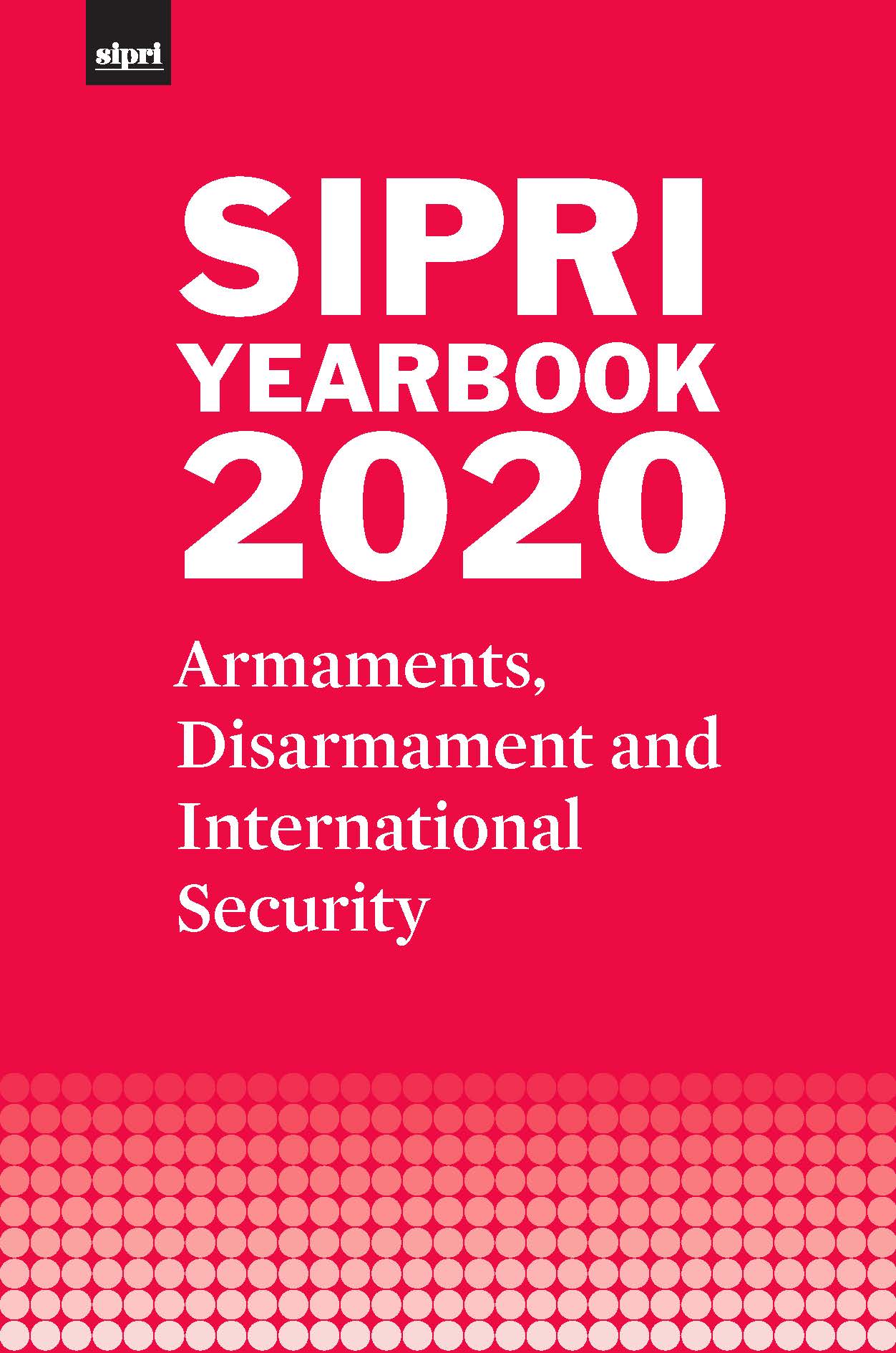|
| NEWS |
 |
| 2020 Stockholm Security Conference |
| On 17–20 November 2020, SIPRI hosted the fifth annual Stockholm Security Conference. The theme of this year’s conference was ‘International Cooperation: Navigating the Way Ahead’. So far, the conference has already engaged over 2000 people from over 60 different countries with greater numbers expected as more sessions are uploaded to SIPRI’s YouTube channel in the coming weeks. SIPRI extends its gratitude to all those who made the conference possible. |
|
|
Read more | Watch the 2020 Stockholm Security Conference playlist
|
|
|
 |
| SIPRI partners with the German Federal Foreign Office for 2020 conference on technology and arms control |
|
On 5–6 November, SIPRI was a thematic partner to the international conference on ‘2020. Capturing Technology. Rethinking Arms Control’. The conference was held in a virtual format and organized by the German Federal Foreign Office. During the conference, SIPRI hosted a highly interactive breakout session on ‘The Military Use of Artificial Intelligence: Artificial and Real Challenges for Arms Control’ that was attended by over 200 participants. Ahead of the conference, SIPRI published two reports on the governance of artificial intelligence (AI).
|
|
|
Read more | Read more about the conference | Read the reports on artificial intelligence
|
|
|
|
|
|
| COMMENTARY |
 |
| Diluted disarmament in space: Towards a culture for responsible behaviour |
|
The use of outer space was once associated only with governments. Now, outer space is increasingly becoming a commercial place that is heavily utilized by the private sector and companies such as SpaceX, OneWeb and Amazon. The increased involvement of the private sector in space has several implications for space security. Indeed, the need for enhanced security protocols for outer space is therefore needed now more than ever before. This SIPRI Essay highlights the importance of space security and delineates the limited regulation under international space law. It proposes a new approach to developing disarmament measures for space.
|
|
Read the SIPRI Essay
|
|
|
 |
| Cultural reconstruction is critical after Islamic State occupation |
|
The scars left by the Islamic State group’s occupation in northern Iraq are deep and minority communities in Nineveh province have been particularly affected. To date, reconstruction in Nineveh has mainly focused on the more physical, visible aspects. Undoubtedly this is important, but the damage inflicted on these groups’ cultural identities is less often discussed. This SIPRI Essay suggests ways forward to reinstate cultural identity, and the ability to practice unique customs, rites and traditions for these communities. These underpin the communities’ sense of belonging—in Nineveh and in Iraq.
|
|
Read the SIPRI Essay
|
|
 |
| Autocracy is on the rise: Should we expect military spending to follow? |
|
Autocracies are once again the global majority. Democratic institutions in countries as diverse as Hungary and Mali are weakening, leading to consequences of as yet unknown dimensions. A likely outcome is an increase in military spending: there is a significant body of evidence showing that autocracies spend more than democracies on their militaries, all else being equal. This SIPRI Topical Backgrounder discusses the possible consequences of growing autocratization on military spending. It examines the case of Brazil’s recent autocratization and how it has affected the country’s military spending.
|
|
Read the SIPRI Topical Backgrounder
|
|
 |
| Maritime disputes in the eastern Mediterranean: Why and why now? |
|
In August 2020, Greek and Turkish frigates collided in the eastern Mediterranean, causing diplomatic and military tension. The disputes over maritime jurisdiction in the Aegean and the eastern Mediterranean are long-standing, but more recently they have become particularly hostile. The process of seemingly unstoppable escalation in the area has become a matter of concern in 2020, with no apparent easy fix. This SIPRI Essay explores the background to recent events by focusing on the perceptions of the key actors.
|
|
Read the SIPRI Essay
|
|
|
| UPCOMING EVENTS |
| |
| 2 December 2020 |
| SIPRI to host panel at PAX Protection of Civilians Conference 2020 |
|
On 2 December, SIPRI will host a panel discussion on ‘Local Understandings of Human Security: Evidence from the Field’. The panel discussion will be held in a virtual format as part of the PAX Protection of Civilians Conference 2020.
|
|
Read more
|
|
|
| RECENT EVENTS |
| |
| 12 November 2020 |
| SIPRI hosts event on harmonizing EU–China approaches to financing green development |
|
On 12 November, SIPRI hosted a virtual dialogue on ‘Towards harmonized approaches to financing green development’. The dialogue aimed to increase mutual learning between the EU and China, while also bringing third countries and regions into the conversation. The discussions also addressed the different priorities and approaches of the various actors, assessing challenges and prospects for cooperation to 2030 and beyond.
|
|
Read more
|
|
|
| PUBLICATIONS |
 |
| Increasing Women’s Representation in EU Civilian CSDP Missions |
| EU member states established the Civilian Common Security and Defence Policy (CSDP) Compact in 2018 to strengthen civilian CSDP missions. Among other things, they committed to promoting better representation of women. Women have remained underrepresented at most levels in these missions, including leadership. This SIPRI Policy Brief provides an analysis of data on women’s representation to CSDP missions. It recommends that EU member states should set targets for women’s representation in civilian CSDP missions and commit to gender parity in future leadership appointments. |
|
Read the SIPRI Policy Brief
|
|
|
 |
| Increasing Member State Contributions to EU Civilian CSDP Missions |
| The EU Civilian CSDP Compact was established in 2018, where EU member states committed to increasing the number and share of seconded personnel in civilian CSDP missions. Both had been decreasing in previous years. The number of seconded personnel started to increase in 2019 but discontinued thereafter, most likely as a consequence of the coronavirus disease 2019 (COVID-19) pandemic. This SIPRI Policy Brief suggests ways forward for both EU member states and the European External Action Service on how to ensure they deliver on these commitments. |
|
Read the SIPRI Policy Brief
|
|
|
 |
| Addressing Missile Threats in the Middle East and North Africa |
| This SIPRI Policy Brief contributes to the discussion on missile proliferation in the Middle East and North Africa by providing an overview of regional missile arsenals and by considering ways to address related risks. The report makes policy recommendations, highlighting the need to move beyond the selective focus on certain types of missiles in the hands of certain states, towards a more comprehensive approach based on greater transparency, responsible arms exports and confidence- and security-building measures. |
|
Read the SIPRI Policy Brief
|
|
|
 |
| Responsible Artificial Intelligence Research and Innovation for International Peace and Security |
| This report explores how responsible research and innovation could help to address the humanitarian and strategic risks that may result from the development, diffusion and military use of AI and thereby achieve arms control objectives on the military use of AI. The report makes recommendations on how the arms control community could build on existing responsible AI initiatives and export control and compliance systems to engage with academia and the private sector in the governance of risks to international peace and security posed by the military use of AI. |
|
Read the SIPRI Report
|
|
|
 |
| Responsible Military Use of Artificial Intelligence: Can the European Union Lead the Way in Developing Best Practice? |
| In 2019, several EU member states called for greater collaboration between EU member states on the topic of AI in defence. This report explains why the EU and its member states would benefit politically, strategically and economically from developing principles and standards for the responsible military use of AI. The report offers concrete ways for the EU and its member states to work towards common principles and best practices for the responsible military use of AI. |
|
Read the SIPRI Report
|
|
|
 |
| Strategies for Including Women’s and LGBTI Groups in the Colombian Peace Process |
| The Colombian peace negotiation process is highly regarded as one of the most inclusive processes; involving civil society groups from diverse backgrounds, including both women’s and lesbian, gay, bisexual, transgender/ transsexual and intersex (LGBTI) groups. This SIPRI Background Paper applies a conflict resolution and negotiation framework to assess the involvement of women’s and LGBTI groups in the most recent Colombian peace negotiation process. |
|
Read the SIPRI Background Paper
|
|
|
 |
| Strengthening Global Regimes: Addressing the Threat Posed by Chemical Weapons |
| When the 1993 Chemical Weapons Convention (CWC) state parties come together for a review in late 2020, they will have to assess whether their response to the challenges posed by the use of chemical weapons has been proportionate to the threat. If not, then they will have the responsibility to create the new capacities, invent the new instruments and develop the new initiatives that will make their efforts more effective. This SIPRI Policy Paper provides an explanation of the context for some important recent decisions and an analysis of them. It also proposes some actions that CWC states parties could take together in support of the effort to eliminate the threat of chemical weapons. |
|
Read the SIPRI Policy Paper
|
|
|
 |
| The Geopolitics of Food Security: Barriers to the Sustainable Development Goal of Zero Hunger |
| Assessing the prospects for Zero Hunger—Sustainable Development Goal 2—requires an understanding of food security that goes beyond developmental or humanitarian issues, to include linkages with geopolitics. Geopolitical challenges cut across areas such as natural resources, trade, armed conflict and climate change where unilateralism and zero-sum approaches to security directly hamper efforts to eradicate hunger and undermine the frameworks that govern those efforts. This SIPRI Insights on Peace and Security provides an overview of how geopolitics interacts with these areas. |
|
Read the SIPRI Insights on Peace and Security
|
|
|
 |
| SIPRI Yearbook 2020 |
SIPRI Yearbook 2020 presents a combination of original data in areas such as world military expenditure, international arms transfers, arms production, nuclear forces, armed conflicts and multilateral peace operations with state-of-the-art analysis of important aspects of arms control, peace and international security. It covers developments during 2019, including:
- the state of nuclear arms control;
- transparency in military spending;
- regional overviews of armed conflicts; and
- the investigation of allegations of chemical weapon use in Syria.
|
|
Browse the contents page | Download the summary (PDF) | Order SIPRI Yearbook 2020
|
|
|
| |
|
|
|
|